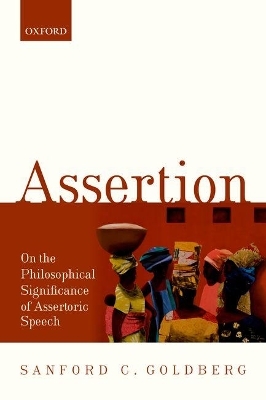
Assertion
Oxford University Press (Verlag)
978-0-19-880157-3 (ISBN)
Sanford C. Goldberg presents a novel account of the speech act of assertion. He defends the view that this type of speech act is answerable to a constitutive norm--the norm of assertion. The hypothesis that assertion is answerable to a robustly epistemic norm is uniquely suited to explain assertion's philosophical significance--its connections to other philosophically interesting topics. These include topics in epistemology (testimony and testimonial knowledge; epistemic authority; disagreement), the philosophy of mind (belief; the theory of mental content), the philosophy of language (norms of language; the method of interpretation; the theory of linguistic content), ethics (the ethics of belief; what we owe to each other as information-seeking creatures), and other matters which transcend any subcategory (anonymity; trust; the division of epistemic labor; Moorean paradoxicality). Goldberg aims to bring out these connections without assuming anything about the precise content of assertion's norm, beyond regarding it as robustly epistemic. In the last section of the book, however, he proposes that we do best to see the norm's epistemic standard as set in a context-sensitive fashion. After motivating this proposal by appeal to Grice's Cooperative Principle and spelling it out in terms of what is mutually believed in the speech context, Goldberg concludes by noting how this sort of context-sensitivity can be made to square with assertion's philosophical significance.
Sanford C. Goldberg is Professor and Chair of the Philosophy Department at Northwestern University. He works on topics at the intersection of epistemology, philosophy of mind, and philosophy of language. He is author of Anti-Individualism (CUP, 2007), Relying on Others (OUP, 2010), and numerous other articles on such topics as disagreement, testimony, reliabilism, metaepistemology, the semantics of speech reports, reference, self-knowledge, and attitude externalism.
Part I: Introduction
1: What is Assertion? In defense of the norm-based account
Part II: The Epistemic Significance of Assertion
2: Assertion and the spread of knowledge
3: Assertion and Testimony
Part III: Other Applications: Mind, Language, and More
4: Assertion and the Method of Interpretation (Radical and Otherwise)
5: Assertion and Assertoric Content
6: Assertion and Belief
7: The Ethics of Assertion (and Belief)
8: Anonymous Assertion
Part IV: A case for context-sensitivity in the Norm of Assertion
9: Assertion and Disagreement
10: Mutuality and Assertion
11: The Costs of Context-Sensitivity
| Erscheinungsdatum | 06.05.2018 |
|---|---|
| Verlagsort | Oxford |
| Sprache | englisch |
| Maße | 157 x 234 mm |
| Gewicht | 514 g |
| Themenwelt | Geisteswissenschaften ► Philosophie ► Erkenntnistheorie / Wissenschaftstheorie |
| Geisteswissenschaften ► Philosophie ► Ethik | |
| Geisteswissenschaften ► Philosophie ► Sprachphilosophie | |
| ISBN-10 | 0-19-880157-2 / 0198801572 |
| ISBN-13 | 978-0-19-880157-3 / 9780198801573 |
| Zustand | Neuware |
| Informationen gemäß Produktsicherheitsverordnung (GPSR) | |
| Haben Sie eine Frage zum Produkt? |
aus dem Bereich
![Was heißt Denken?. Vorlesung Wintersemester 1951/52. [Was bedeutet das alles?] - Martin Heidegger](/media/113619842)

